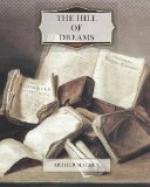Mr. Dixon, as a clergyman, viewed the question from a high standpoint and found it all deplorable, but the general opinion was that Bennett was a hopeless young lunatic. Old Mr. Gervase went purple when his name was mentioned, and the young Dixons sneered very merrily over the adventure.
“I always thought he was a beastly young ass,” said Edward Dixon, “but I didn’t think he’d chuck away his chances like that. Said he couldn’t stand a bank! I hope he’ll be able to stand bread and water. That’s all those littery fellows get, I believe, except Tennyson and Mark Twain and those sort of people.”
Lucian of course sympathized with the unfortunate Bennett, but such judgments were after all only natural. The young man might have stayed in the bank and succeeded to his aunt’s thousand a year, and everybody would have called him a very nice young fellow—“clever, too.” But he had deliberately chosen, as Edward Dixon had said, to chuck his chances away for the sake of literature; piety and a sense of the main chance had alike pointed the way to a delicate course of wheedling, to a little harmless practicing on Miss Spurry’s infirmities, to frequent compliances of a soothing nature, and the “young ass” had been blind to the direction of one and the other. It seemed almost right that the vicar should moralize, that Edward Dixon should sneer, and that Mr. Gervase should grow purple with contempt. Men, Lucian thought, were like judges, who may pity the criminal in their hearts, but are forced to vindicate the outraged majesty of the law by a severe sentence. He felt the same considerations applied to his own case; he knew that his father should have had more money, that his clothes should be newer and of a better cut, that he should have gone to the university and made good friends. If such had been his fortune he could have looked his fellow-men proudly in the face, upright and unashamed. Having put on the whole armor of a first-rate West End tailor, with money in his purse, having taken anxious thought for the morrow, and having some useful friends and good prospects; in such a case he might have held his head high in a gentlemanly and Christian community. As it was he had usually avoided the reproachful glance of his fellows, feeling that he deserved their condemnation. But he had cherished for a long time his romantic sentimentalities about women; literary conventions borrowed from the minor poets and pseudo-medievalists, or so he thought afterwards. But, fresh from school, wearied a little with the perpetual society of barbarian though worthy boys, he had in his soul a charming image of womanhood, before which he worshipped with mingled passion and devotion. It was a nude figure, perhaps, but the shining arms were to be wound about the neck of a vanquished knight; there was rest for the head of a wounded lover; the hands were stretched forth to do works of pity, and the smiling lips were to murmur not love alone, but consolation in defeat.




